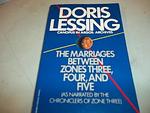Doris Lessing
Doris Lessing was a British novelist, poet, playwright, librettist, biographer, and short story writer. She was born on October 22, 1919, in Iran and grew up in Zimbabwe. She moved to London after World War II, where she published her first novel, 'The Grass is Singing' (1950). Lessing is best known for her series 'Children of Violence' and for her 1962 novel 'The Golden Notebook', which is considered a landmark work of feminist literature. She was awarded the Nobel Prize in Literature in 2007. Doris Lessing passed away on November 17, 2013.
Books
This list of books are ONLY the books that have been ranked on the lists that are aggregated on this site. This is not a comprehensive list of all books by this author.
-
1. The Golden Notebook
The novel centers around a woman named Anna Wulf, a writer who keeps four notebooks, each representing a different aspect of her life: her experiences in Africa, her current life in London, a novel she is writing, and her personal experiences. As Anna's mental state deteriorates, she attempts to unify her fragmented self in a fifth notebook, the golden notebook. The novel explores themes of mental breakdown, communism, the changing role of women, and the fear of nuclear war.
-
2. The Grass Is Singing
Set in 1940s Southern Rhodesia (now Zimbabwe), this novel explores the life of a white woman, Mary, who marries a poor farmer, Dick Turner, and moves to the African veld. The story delves into their failing farm, their troubled marriage, and the racial tension surrounding their life. The isolation and harsh African environment take a toll on Mary's sanity, leading to a complex and ultimately fatal relationship with her black houseboy, Moses. The book provides a stark examination of the inherent racism of colonialism and the tragic consequences it can have on both the oppressors and the oppressed.
-
3. African Stories
This collection of stories offers a diverse and multifaceted portrayal of African life, drawing from the author's own experiences growing up on a farm in Rhodesia. The tales span across time, from pre-colonial Africa to the modern era, and tackle themes of race, colonialism, gender, and power. The narratives are richly detailed, providing a vivid glimpse into the complexities and contradictions of African society.
-
4. Briefing For A Descent Into Hell
In this novel, a man found wandering the streets of London with no memory is admitted to a psychiatric hospital, where doctors attempt to diagnose and treat his condition. As he remains in a comatose state, the narrative delves into his complex inner world, blending reality with fantastical visions. Through his journey, the book explores themes of identity, the human psyche, and the boundaries between sanity and madness. The narrative challenges the conventional understanding of mental illness and the nature of reality, inviting readers to question the structures of society and the mind.
-
5. The Fifth Child
The novel explores the turbulent life of a conventional British family whose idealistic vision of domestic bliss is shattered by the birth of their fifth child. This child is vastly different from his siblings—violent, antisocial, and seemingly unmanageable. His presence brings about a profound transformation in the family dynamics, leading to isolation, fear, and the disintegration of family bonds. The story delves into themes of societal norms, the nature versus nurture debate, and the limits of parental love, as the family grapples with the challenges posed by a child who defies all expectations and the impact he has on everyone around him.
-
6. The Marriages Between Zones Three, Four, And Five
This novel is a thought-provoking exploration of the relationships and dynamics between different societal zones, each with its own distinct culture and governance. The narrative focuses on the arranged marriage between Al-Ith, the queen of the matriarchal, peaceful, and artistic Zone Three, and Ben Ata, the king of the patriarchal, warlike, and disciplined Zone Four. Their union, decreed by unseen higher powers, is meant to bring about the integration and mutual understanding between their contrasting worlds. As the story unfolds, it delves into themes of power, love, gender roles, and the potential for personal and societal transformation. Through the challenges and changes that the characters experience, the novel examines the complex interplay between different ways of life and the possibility of harmony amidst diversity.





